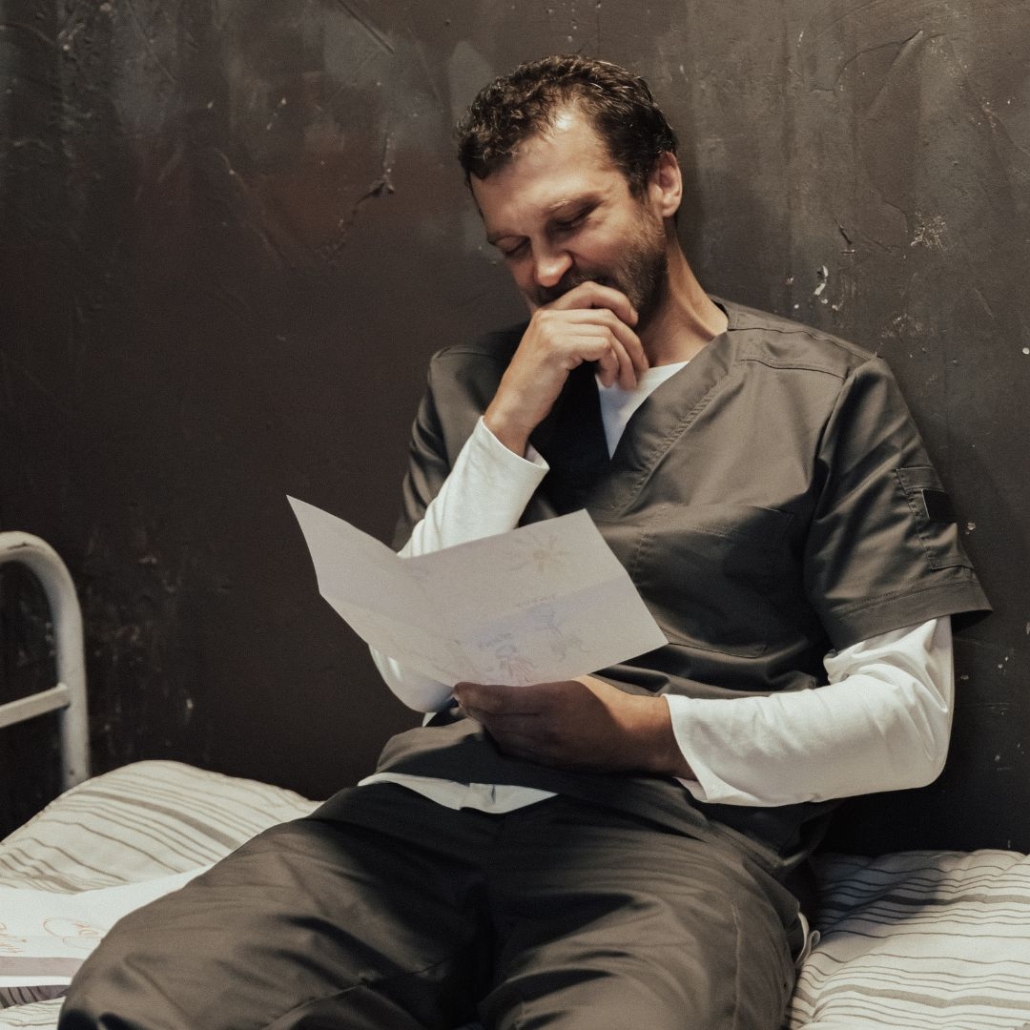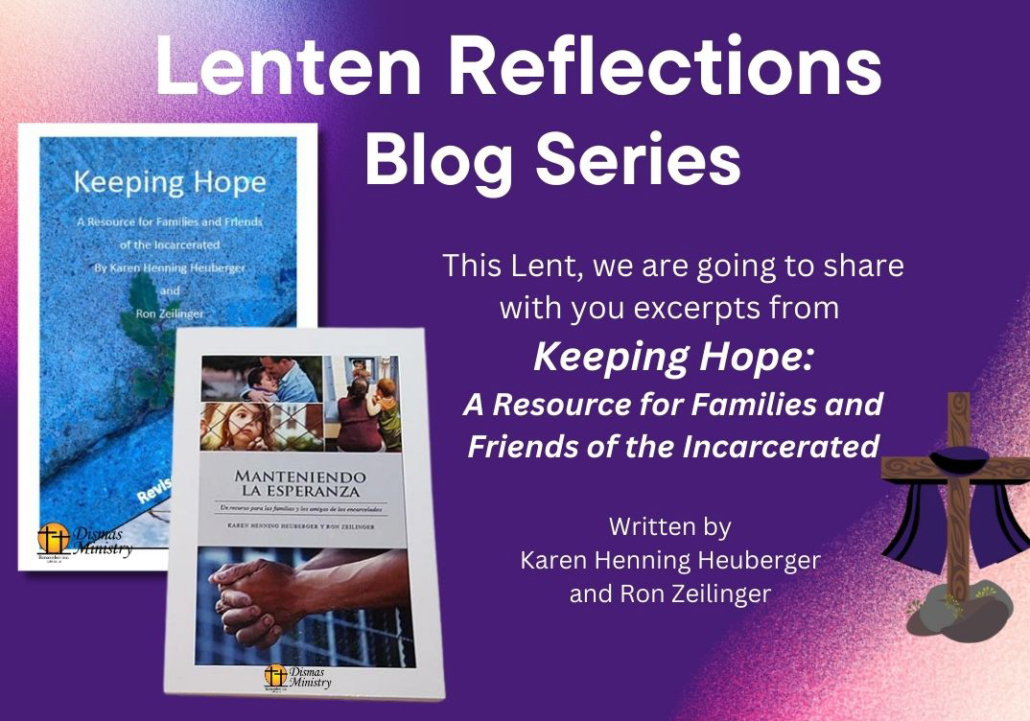This Lent, we are going to share with you excerpts from Keeping Hope: A Resource for Families and Friends of the Incarcerated
Written by Karen Henning Heuberger and Ron Zeilinger
“Making Contact: The Hardest Part is Leaving”
Our first visit to the county jail was not great. I felt like we were treated just like the inmates. I kept thinking “can’t they feel our pain?”
Staying in contact with your family member or friend can be an enormous source of comfort for both you and them. While you may be separated for an extended period of time, writing letters, talking on the phone, and visiting if possible can help you stay connected. It also may bring tremendous comfort to the incarcerated to receive any communication from loved ones.
 Writing Letters and Sending Packages
Writing Letters and Sending Packages
When writing letters and sending packages to your loved one, you need to make sure you follow regulations in what is allowed to be sent. Based on the regulations where your loved one is incarcerated, you may be able to send him or her clothes, books, food items, and other meaningful and special personal things. If you do not follow regulations, however, your package will be returned. Mail may take days or even weeks to get through to your loved one. It must be reviewed by a staff person, as do the letters from your loved one, so it may take some time for you to adjust to the lack of privacy.
It may be difficult for your loved one to write letters to you. He or she will need to have the basic supplies – paper, pen, stamps, envelopes, etc. Some facilities may provide a limited amount of such supplies, but others do not. You can usually send supplies if they are requested – and the request is approved by the staff. Usually you cannot send stamps because the stamp adhesive could contain drugs.
Sometimes your loved one may express anger in their letters. He or she may pass judgment on you or others involved in the situation. Or, your loved one may not or cannot write about what goes on in prison. But prison staff usually encourage inmates to write to their family and friends. It helps with morale, and contact with family and friends can help the inmate keep focused on spending the time of incarceration preparing to be reunited with them.
Even if your relationship isn’t the best, there are ways you and your loved one can share and grow closer through letters. Just copy and paste a favorite comic strip from the newspaper or tell him or her about a ball game you watched . If it is appropriate, sharing Scripture is another meaningful way to communicate. Each of you can read the same bible passages and share in letters what you each took from those passages. Keep the communication going. Set aside a day and time of the week or month that you will communicate with your loved one. Whatever you share, letter writing is a way to foster the relationship and it may be just as helpful to you as it is to the one in prison.
Phone Calls
Connecting with a prisoner over the phone can bring the joy and pleasure of just hearing your loved one’s voice and laughter, but also has challenges of its own. It can be hard to get used to the idea that the person cannot just be called to the phone. Calls are monitored and this additional lack of privacy may also take a while to get used to. The calls may also have recorded messages that play throughout your conversation. Because the calls are timed, the recordings will tell you how much time you have left. When the time is up, the call is automatically disconnected. Depending on the facility, security level, or disciplinary action, your family member or loved one may have limited or no phone privileges.
Because they require companies that can monitor the conversations, calls from the correctional system are very expensive. While states get some of the money from these expenses, some of the states (i.e. Nevada) use that money to improve the facilities. Inmates call collect unless they have money in their accounts for the calls.
Visiting Your Loved One in Prison
Before you visit your family member or friend in a correctional facility for the first time, you may be very anxious to see him or her and just want to make sure he or she is okay. But you may also have a number of emotions. You may have concerns about finding the prison or how you will be treated by the correctional officers. You may be afraid of the rules and that you might inadvertently break one, or worried that you may see someone you know. You may be concerned about how your loved one is treated in prison. You may have anxiety because your relationship with your loved one may be strained due to the circumstances. You may be unsure how to be with your loved one now that he or she is no longer under the influence of drugs or alcohol. You may be concerned about your loved one’s morale or mental status, worried that his or her spirit may be broken by the experience. You may be resentful of the time or expense of having to travel to visit your loved one. Whatever you are feeling, take time to breathe and do what you can to prepare yourself. As mentioned earlier, before you go visit the correctional facility, make sure you are aware of the regulations for visiting. The facility’s handbook for family and friends should be able to give you this information. One of the biggest issues is clothing. There are many restrictions regarding what you can wear in the institution. Certain colors may be banned, as are tight clothes and tank tops. Because you have to be able to pass through a metal detector, women need to be sure not to wear an underwire bra. Skirts and dresses have to be a designated minimum length. Of course, every facility has its own rules. Federal prisons are standardized, but different officers may still allow different things, so you need to be prepared. Special note: If you require an oxygen apparatus or have a pacemaker, you will need special forms and a physician’s authorization. Follow the instructions of the facility well in advance of your visit.
For undocumented families in the United States, visiting can be an even greater challenge. Sometimes undocumented family members do not visit their loved ones in prison for various reasons. Most undocumented families do not have valid driver’s licenses, and therefore often avoid driving long distances for the fear of getting pulled over by the police or sheriff. They fear visiting a prison because they believe the prison officers will report them to the immigration authorities, and their visit will end up in deportation. They may also be afraid of being barred and denied entry to visit their love one because their foreign identification card may not be acceptable.
However, all these fears and doubts can be addressed with proper information and preparation.

READ MORE FROM KEEPING HOPE BY PURCHASING YOUR COPY ON OUR STORE PAGE.




